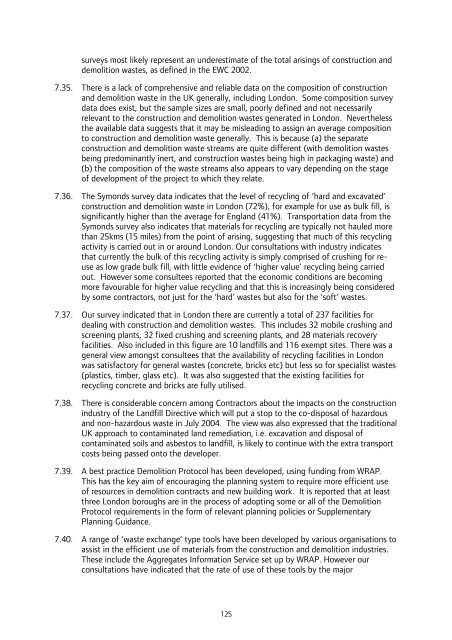London Wider Waste Strategy - London - Greater London Authority
London Wider Waste Strategy - London - Greater London Authority
London Wider Waste Strategy - London - Greater London Authority
Create successful ePaper yourself
Turn your PDF publications into a flip-book with our unique Google optimized e-Paper software.
surveys most likely represent an underestimate of the total arisings of construction and<br />
demolition wastes, as defined in the EWC 2002.<br />
7.35. There is a lack of comprehensive and reliable data on the composition of construction<br />
and demolition waste in the UK generally, including <strong>London</strong>. Some composition survey<br />
data does exist, but the sample sizes are small, poorly defined and not necessarily<br />
relevant to the construction and demolition wastes generated in <strong>London</strong>. Nevertheless<br />
the available data suggests that it may be misleading to assign an average composition<br />
to construction and demolition waste generally. This is because (a) the separate<br />
construction and demolition waste streams are quite different (with demolition wastes<br />
being predominantly inert, and construction wastes being high in packaging waste) and<br />
(b) the composition of the waste streams also appears to vary depending on the stage<br />
of development of the project to which they relate.<br />
7.36. The Symonds survey data indicates that the level of recycling of ‘hard and excavated’<br />
construction and demolition waste in <strong>London</strong> (72%), for example for use as bulk fill, is<br />
significantly higher than the average for England (41%). Transportation data from the<br />
Symonds survey also indicates that materials for recycling are typically not hauled more<br />
than 25kms (15 miles) from the point of arising, suggesting that much of this recycling<br />
activity is carried out in or around <strong>London</strong>. Our consultations with industry indicates<br />
that currently the bulk of this recycling activity is simply comprised of crushing for reuse<br />
as low grade bulk fill, with little evidence of ‘higher value’ recycling being carried<br />
out. However some consultees reported that the economic conditions are becoming<br />
more favourable for higher value recycling and that this is increasingly being considered<br />
by some contractors, not just for the ‘hard’ wastes but also for the ‘soft’ wastes.<br />
7.37. Our survey indicated that in <strong>London</strong> there are currently a total of 237 facilities for<br />
dealing with construction and demolition wastes. This includes 32 mobile crushing and<br />
screening plants, 32 fixed crushing and screening plants, and 28 materials recovery<br />
facilities. Also included in this figure are 10 landfills and 116 exempt sites. There was a<br />
general view amongst consultees that the availability of recycling facilities in <strong>London</strong><br />
was satisfactory for general wastes (concrete, bricks etc) but less so for specialist wastes<br />
(plastics, timber, glass etc). It was also suggested that the existing facilities for<br />
recycling concrete and bricks are fully utilised.<br />
7.38. There is considerable concern among Contractors about the impacts on the construction<br />
industry of the Landfill Directive which will put a stop to the co-disposal of hazardous<br />
and non-hazardous waste in July 2004. The view was also expressed that the traditional<br />
UK approach to contaminated land remediation, i.e. excavation and disposal of<br />
contaminated soils and asbestos to landfill, is likely to continue with the extra transport<br />
costs being passed onto the developer.<br />
7.39. A best practice Demolition Protocol has been developed, using funding from WRAP.<br />
This has the key aim of encouraging the planning system to require more efficient use<br />
of resources in demolition contracts and new building work. It is reported that at least<br />
three <strong>London</strong> boroughs are in the process of adopting some or all of the Demolition<br />
Protocol requirements in the form of relevant planning policies or Supplementary<br />
Planning Guidance.<br />
7.40. A range of ‘waste exchange’ type tools have been developed by various organisations to<br />
assist in the efficient use of materials from the construction and demolition industries.<br />
These include the Aggregates Information Service set up by WRAP. However our<br />
consultations have indicated that the rate of use of these tools by the major<br />
125
















